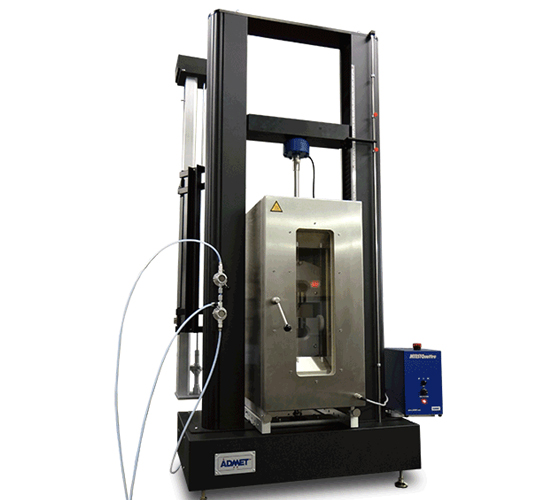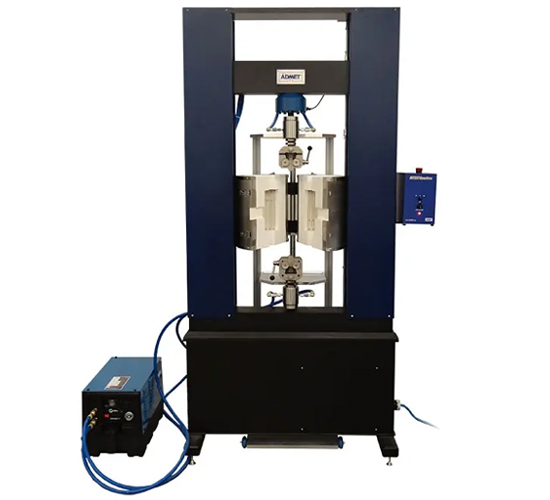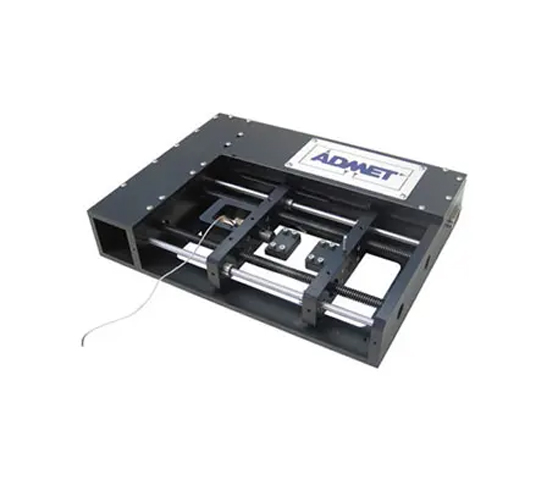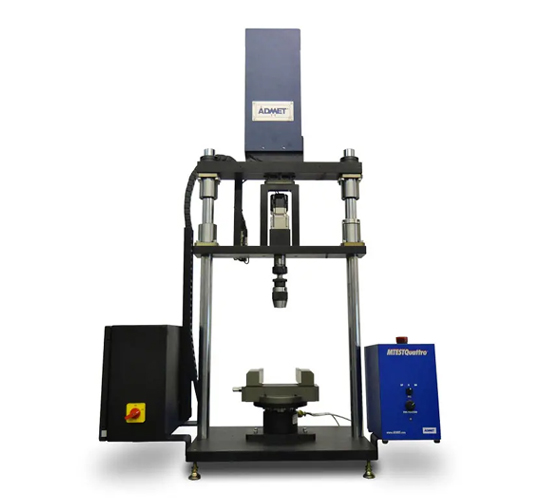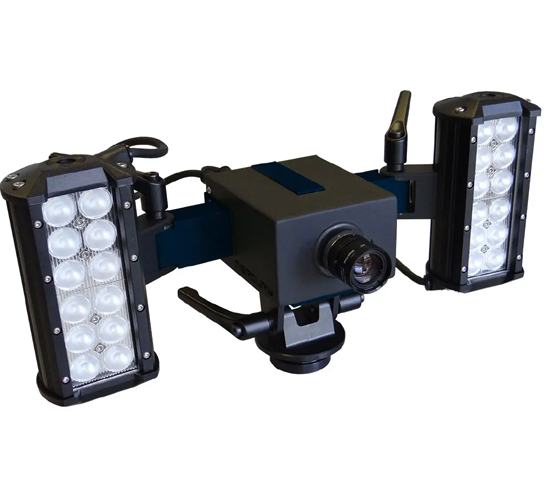
The Video Extensometer provides highly accurate, non-contact strain measurement with optical precision, ideal for testing materials under tensile or compression stress. This extensometer uses advanced video technology for precise displacement measurement and is widely used in material testing labs and research settings.
The Video Extensometer is perfect for industries requiring high-precision strain measurements, including materials science, automotive, aerospace, and structural engineering. It is especially useful for testing delicate or irregularly shaped samples where traditional extensometers may not be suitable.
universal testing machine accessories, universal testing machine price, accessories, video extensometer, strain measurement, non-contact extensometer, optical strain measurement, ASTM E83.
The Video Extensometer is an advanced, non-contact extensometer designed for precise measurement of strain during material testing. Using video-based technology, it provides high-accuracy strain data by tracking the movement of markers placed on a specimen’s surface during tension, compression, or flexural testing with universal testing machines. This extensometer is particularly useful in research and quality control applications, where traditional contact-based extensometers may not be suitable due to specimen characteristics or the need for high-precision measurements.
The Video Extensometer works by capturing high-resolution video footage of the specimen in real-time, analyzing the movement of distinct markers placed along the specimen’s length. This allows it to measure both axial and transverse strain without physically contacting the specimen, making it ideal for soft, thin, or delicate materials that could be damaged by traditional extensometer grips.
This extensometer provides several key benefits, such as high accuracy, the ability to measure large areas of deformation, and real-time strain analysis. It is compatible with a wide range of materials, including metals, plastics, composites, rubber, and even biological specimens, making it suitable for various industries, including aerospace, automotive, research, and materials science.
The Video Extensometer is equipped with sophisticated software that processes the video footage and calculates strain values with minimal user intervention. The software provides real-time feedback, enabling the user to monitor material behavior during testing and making it easier to conduct detailed post-test analyses. It also helps in detecting microstructural changes during testing, which are often missed by traditional contact-based methods.
Easy to install and integrate with most universal testing machines, the Video Extensometer enhances testing flexibility and accuracy. It is particularly effective for tests requiring high precision, such as evaluating material failure mechanisms or performing tests at high speeds.
For more information on the Video Extensometer, customization options, and universal testing machine price, contact us today.
The Video Extensometer is an innovative, non-contact solution for high-precision strain measurement, offering advanced capabilities for a wide range of testing applications and seamlessly integrating with universal testing machines for accurate and reliable data.
Tensile Testing of Metals: The Video Extensometer is widely used in the tensile testing of metals such as steel, aluminum, and titanium. It offers precise measurements of strain, even at high elongation, without physically touching the specimen, ensuring accurate data on ductility, yield strength, and strain hardening.
Polymer and Plastic Testing: Used to test polymers and plastics, the Video Extensometer helps measure elongation, strain distribution, and necking behavior during tensile tests. This is especially useful in the automotive, packaging, and consumer goods industries.
Composite Material Testing: The Video Extensometer is ideal for measuring strain in composite materials like carbon fiber and glass fiber during tensile or flexural testing. It ensures accurate data for evaluating interlaminar shear strength and fiber alignment in industries like aerospace and automotive.
Rubber and Elastomer Testing: In rubber and elastomer testing, this extensometer is used to measure large elongations without contact, which is essential for determining elastic modulus, tensile strength, and resilience of rubbers used in automotive or industrial applications.
Textile and Fiber Testing: Used for textile testing, the Video Extensometer measures stretchability and strength of fibers and fabrics. Its non-contact measurement makes it especially useful for testing delicate materials where traditional extensometers might cause damage.
Biomaterials and Medical Devices Testing: The Video Extensometer is used to evaluate the strain and deformation of biomaterials, medical implants, and prosthetic devices during mechanical tests. It provides a non-contact method to evaluate stress-strain behavior without affecting the test specimen.
Foam and Packaging Material Testing: In testing foams and packaging materials, the Video Extensometer helps in measuring elongation and compression properties of materials under stress, which is essential for evaluating the performance and durability of packing and insulation materials.
Geotechnical Material Testing: This extensometer is also used in geotechnical testing to measure deformation in soils and rocks under load, providing valuable data on the compressibility and strain characteristics in geotechnical engineering.
Concrete and Cement Testing: In concrete testing, the Video Extensometer measures strain in concrete beams and slabs to evaluate their bending and crack propagation behavior under stress. This helps ensure that structural concrete materials meet required standards for building and construction.
Structural Testing of Components: The Video Extensometer is employed for testing structural components like beams, welds, and joints under various loading conditions. It helps assess the strain and deformation without the need for direct contact, thus preserving the integrity of the specimen during tests.
The Video Extensometer is an essential tool in the field of material testing. Its non-contact measurement capabilities, combined with high precision, make it ideal for industries where accurate, real-time strain measurements are required, such as aerospace, automotive, biomedical, and construction. This extensometer ensures reliable and consistent performance during testing, contributing to the development of safer, stronger, and more durable materials across a wide range of applications.
The Video Extensometer is an advanced optical device used to measure the strain of materials during tensile testing. It uses high-resolution cameras and image processing technology to track and measure the deformation of a specimen in real-time, capturing both longitudinal and transverse strains without direct contact with the specimen.
The Video Extensometer operates by using a high-speed camera to capture images of the specimen during a tensile test. The camera records the displacement of markers or grids placed on the specimen’s surface, and through image analysis software, the system calculates the strain. This allows for precise measurement of both elongation and lateral deformation during testing.
The Video Extensometer is highly versatile and can be used to test a wide variety of materials, including:
Plastics
It is particularly beneficial for testing materials that are difficult to grip with traditional extensometers or where non-contact measurement is preferred.
Advantages of the Video Extensometer include:
Improved accuracy for elongation and deformation measurement over traditional mechanical extensometers.
To set up the Video Extensometer:
Yes, the Video Extensometer is capable of handling cyclic testing where the material undergoes repeated loading and unloading cycles. It can accurately measure strain during each cycle, making it suitable for fatigue testing and materials that will be subjected to repetitive stresses.
The Video Extensometer can measure a wide range of strains, typically from small elongations in materials to large deformations, depending on the material and testing conditions. It is capable of capturing strain measurements from less than 0.1% to several percent, ensuring precision for both ductile and brittle materials.
The Video Extensometer is used in numerous industries for high-precision strain measurements, including:
R&D labs (for various experimental testing applications).
Key features of the Video Extensometer include:
Minimal specimen preparation compared to other extensometer types.
The Video Extensometer typically comes with a one-year warranty against manufacturing defects. Extended warranty options may be available depending on the specific model and customer needs.
